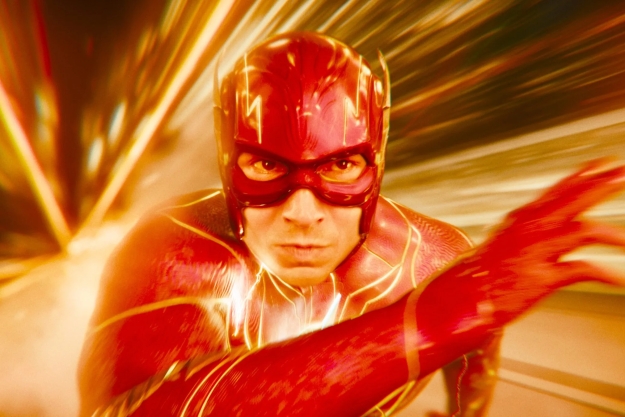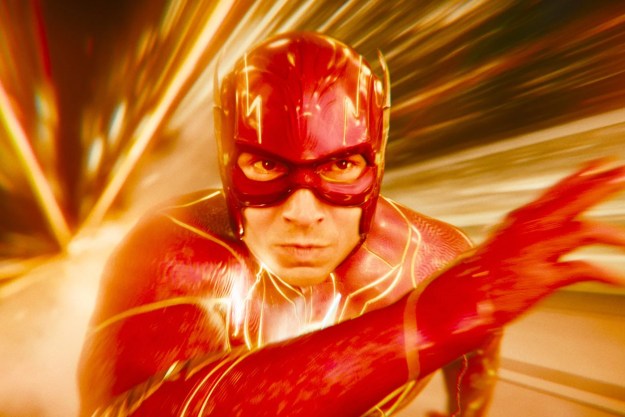
“Director Andy Muschietti’s The Flash doesn’t just trip and fall; it lands flat on its face.”
- Michael Keaton and Sasha Calle’s scene-stealing performances
- Horrible VFX throughout
- An overstuffed, Easter egg-reliant plot
- A pandering, soulless third-act climax
The Flash was, by all accounts, an extremely taxing labor of love for those involved, including director Andy Muschietti. No pleasure can be derived then from reporting that the film is, through and through, an unmitigated disaster. An overstuffed 144-minute wannabe epic that packs in more cameos, Easter eggs, and DC tie-ins than it knows what to do with, The Flash is a hollow exercise in fanboy wish fulfillment. Over the course of its runtime, the film repeatedly raises a handful of legitimately interesting ideas only to abandon them in favor of zero-calorie, nostalgia-bait moments that seem solely designed to make comic book fans scream with excitement in the theater.
No film has ever made Martin Scorsese’s characterization of superhero movies as “theme parks” seem more valid. The Flash wholeheartedly embraces all of the worst trends that currently dominate the superhero genre, including the kind of mind-numbingly bad visual effects that feel like they could only have been made by overworked and underpaid artists who weren’t given enough time to actually do their jobs. Even more distressingly, the film moves its genre closer to a form of empty spectacle that prioritizes brand logos and spandex suits over the flesh-and-blood human beings that actually bring life to the superhero genre’s characters and worlds.
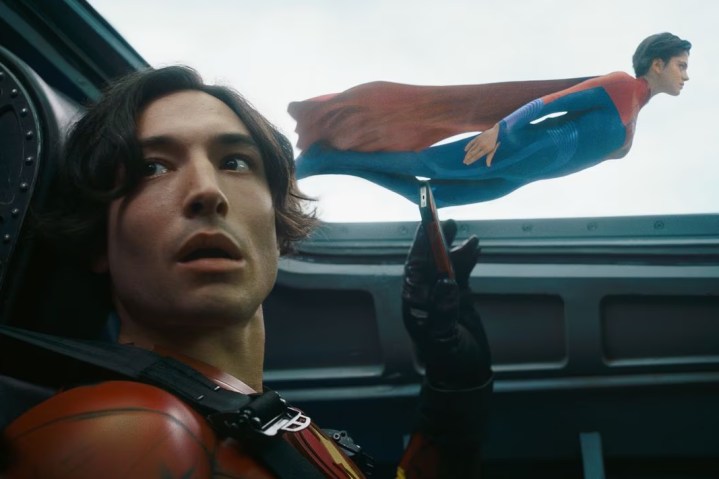
Heavily inspired by the iconic Flashpoint comic book arc, The Flash picks up with its eponymous hero, Barry Allen (Ezra Miller), sometime after the events of Justice League. In its opening sequence, which follows Barry as he saves an entire room of babies from the wreckage of a crumbling hospital, The Flash establishes its hero’s place as his superhero team’s go-to “janitor.” Unsurprisingly, it isn’t long before Barry has made a colossal mess of his own.
After discovering that he has the ability to travel through time, Barry decides to go back into the past and prevent the death of his mother, Nora (Maribel Verdú), which not only permanently robbed him of one parent, but also wrongly sent his father, Henry (Ron Livingston), to prison. In doing so, Barry creates a new reality, one in which an alternate version of himself got to grow up without knowing what it was like to ostensibly lose both of his parents. While he doesn’t realize it at first, Barry’s actions have a number of other ripple effects.
Throughout The Flash’s second act, Barry discovers that his time-traveling decisions have resulted in Ben Affleck’s Bruce Wayne being replaced by Michael Keaton’s, Jason Momoa’s Arthur Curry (aka Aquaman) never being born, and Kara Zor-El/Supergirl (Sasha Calle) arriving on Earth instead of her cousin, Kal-El (Henry Cavill). These changes give The Flash a chance to experiment with the DCEU’s existing canon, honor some of Warner Bros.’ past titles, and even incorporate plot elements and characters from Man of Steel. Michael Shannon, notably, reprises his role as General Zod, whose 2013 invasion of Earth emerges as a potentially even more catastrophic event in Barry’s new timeline than it was in Man of Steel.
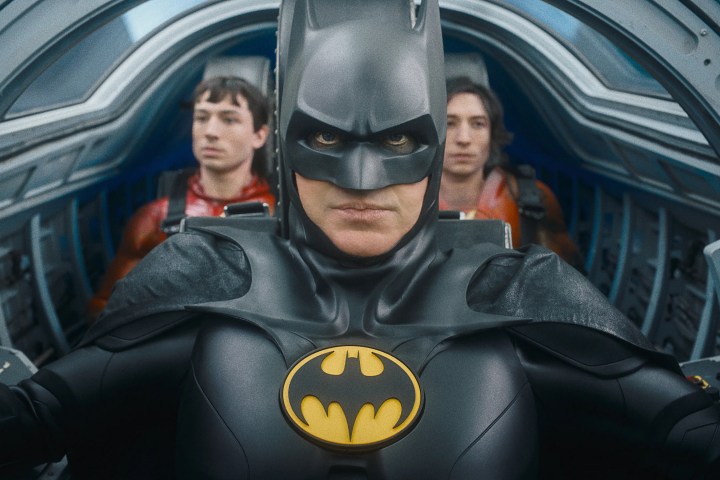
The Flash’s script, which was penned by Birds of Prey writer Christina Hodson, zooms through all of its various multiversal twists at such an admirably fast pace that the film is never slowed down too much by any of its game-changing revelations. Hodson, for her part, brings the same zany, slightly manic sense of humor to The Flash that she did to Birds of Prey, though, Muschietti and Ezra Miller don’t prove to be quite as adept at handling it as Cathy Yan and Margot Robbie. Not even The Flash’s brightest moments of wit and fun are able to make up for its many missteps, either.
There are multiple moments throughout the film in which characters are rendered with the kind of unconvincing CGI that makes them look more like globs of poorly molded Play-Doh than living, breathing human beings. In case its repeated references to the director’s Back to the Future movies weren’t enough, the film often unintentionally occupies the same unnerving, uncanny valley space as many of Robert Zemeckis’ live-action-animation hybrids (see: The Polar Express, A Christmas Carol). Its consistently lacking visual effects make many of the film’s action sequences legitimately hard to watch and cover The Flash in a layer of visual cheapness that doesn’t reflect its reported $200 million budget.
The lackluster nature of The Flash’s visual execution robs its better moments of the weight they might have otherwise had. Many of Barry’s emotional breakthroughs regarding his relationship with his mother and the immutability of the past, for instance, are hampered by the fact that they often take place in unconvincingly realized CGI environments. Muschietti, meanwhile, brings the same disconcertingly flippant, unearned comedic tone to much of The Flash’s violence and chaos that he did in 2019’s It: Chapter 2, which only makes it all the more difficult to actually get invested in its arena-sized superhero set pieces.
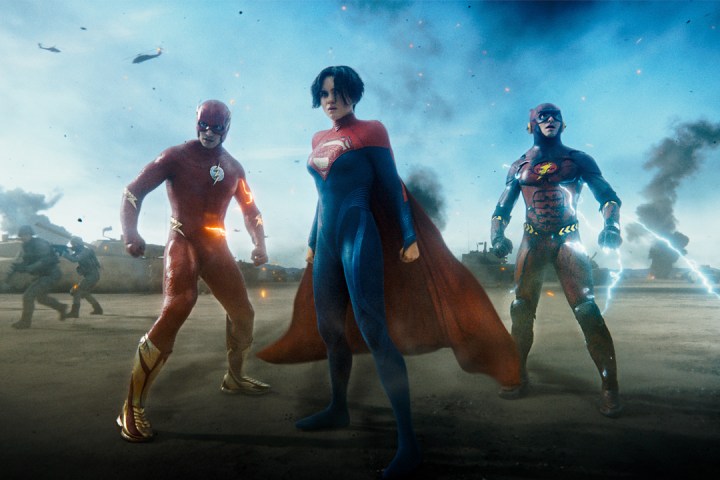
On-screen, their real-life actions over the past few years make it inevitably impossible to get lost in Miller’s dueling lead performances in The Flash. That’s a shame, especially considering that The Flash’s most impressive VFX lie in how seamlessly it manages to make you believe that there are two versions of Miller’s Barry sharing the same physical space throughout most of its second and third acts. Miller’s performances ultimately reflect the unevenness of The Flash, alternately coming across as gratingly over-the-top and emotionally authentic to their character. As a result, the actors who leave the biggest impressions in The Flash are Calle and Keaton.
Calle isn’t given as much to do in the film as she should have been, but her Supergirl makes for a formidable counter to Shannon’s Zod and both versions of Miller’s Barry. While his role in The Flash is a fairly straightforward example of stunt casting, Keaton nonetheless turns in a surprisingly nuanced, understated performance as an updated version of his Bruce Wayne, who has only grown more introspective and interior in the years since viewers last saw him. The overexuberance of The Flash’s plot and its star’s lead performances only make Keaton’s purposefully unshowy turn stand out even more.
Unfortunately, both Keaton and Calle are eventually discarded in The Flash’s third act when the film makes a handful of decisions that are not only shameless instances of fan service, but also morally and creatively abhorrent. In its intended ending, The Flash ditches whatever humanity was present in its story in order to deliver a series of ghoulish moments that feel more like the signs of a forthcoming creative apocalypse than they do celebrations of DC’s cinematic history. After so many years of waiting, it’s a shame that The Flash ultimately goes where it does. Whether it was brought down by its own creative team’s decisions or orders from certain studio executives is unclear. What isn’t is just how violently The Flash cuts itself off at the knees. It isn’t so much a victory lap for the DCEU as it is a massive, multiversal face-plant.
The Flash is now playing in theaters. For more Flash content, check out is the Flash movie streaming?, does The Flash have a post-credits scene?, 10 interesting facts about The Flash movie, and the 5 Flash villains you need to know.
Editors’ Recommendations
Services Marketplace – Listings, Bookings & Reviews
